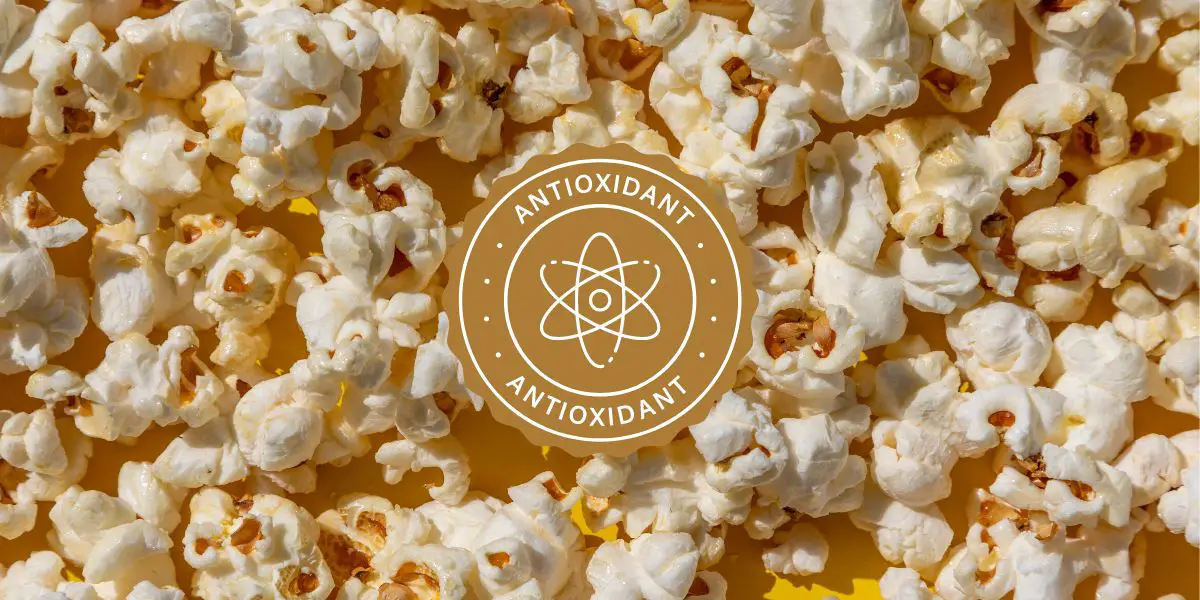A bowl of popcorn can be a delicious, fluffy, satisfying snack when cravings hit, right? Thankfully, there are some health benefits to eating popcorn, but does popcorn contain antioxidants?
As it turns out, popcorn does contain a healthy amount of antioxidants. There are ways to eat your popcorn that either negate or boost these properties.
Are There Any Benefits to Eating Popcorn?
There are many benefits to eating popcorn. It’s a low-calorie snack that provides a high amount of fiber. Additionally, it’s high in antioxidants called polyphenols.
What do polyphenols do?
Polyphenols protect body tissue against oxidative stress from free radicals. This encourages the prevention of cancer, coronary heart disease, and inflammation (which can cause various other issues). Essentially, they keep your blood vessels flexible, promoting good circulation, and helping to control blood sugar levels and blood pressure.
Here are some other benefits to eating popcorn and getting those polyphenols into your body:
- Improved heart health
- Lowering the risk of diabetes
- Lessened risk of cancer
- Block tumor growth
- Raising immunity
- Promotes good gut bacterial growth
The reduction of chronic inflammation is a big deal. Inflammation can cause various diseases, including heart disease.
Learn more about blue popcorn; that has more antioxidants than other varieties.
Not All Popcorn is Created Equal

If you’re eating popcorn regularly for its health benefits, be aware that not all popcorn is created equal. When you drench your popcorn in butter and dump salt on it, you’re canceling many of these benefits and causing issues instead of preventing them.
Also, don’t sleep on the hulls. They might be annoying when they get stuck in your teeth, but those hard pieces are where most of the polyphenols reside (about 90%).
Does Popcorn Have More Antioxidants Than Blueberries?
No, popcorn doesn’t have more antioxidants than blueberries.
Popcorn has a surprising amount of antioxidants (polyphenols). It contains more than many other fruits and vegetables, but not blueberries. One serving of popcorn (air-popped, not microwave popcorn) has around 300mg of polyphenols, whereas blueberries contain 535mg per serving.
Does Popcorn Have More Antioxidants Than Fruits and Vegetables?
Popcorn does have more antioxidants than some fruits and vegetables. That said, the body absorbs more antioxidants (and other nutrients) from some foods than others. Thankfully, it seems that popcorn’s antioxidants are quite bioaccessible.
This doesn’t mean you can substitute popcorn for the fruits and vegetables in your diet, but adding a popcorn snack can boost your antioxidant intake and provide health benefits above and beyond what you’re already getting from your regular diet.
Is Popcorn an Anti-Inflammatory Food?
Popcorn is packed with antioxidants, and antioxidants fight inflammation, so popcorn can be considered anti-inflammatory in that sense.
That said, popcorn is a grain. This means many people have trouble metabolizing it, causing higher levels of inflammation. This is especially bad if the popcorn is high in sodium, which is often the case unless you make it from scratch at home (preferably with an air popper).
Therefore, popcorn is not considered an anti-inflammatory food overall. While it does have some health benefits, if your goal is to reduce the amount of inflammation in your body, popcorn won’t be a dietary choice that will help you achieve that.
Boosting the Anti-Inflammatory Properties of Popcorn
If you want to take advantage of the anti-inflammatory properties of popcorn without suffering any gut problems, there are a few things to do.
Add Healthy Fats
Healthy fats can help reduce inflammation, canceling out any irritation caused by the popcorn grains and still allowing you to enjoy the polyphenol benefits.
Here are some healthy fats to top your popcorn with next time instead of butter:
- Ghee (clarified butter; no lactose)
- Coconut oil
- Avocado oil
- Extra virgin olive oil
- Add Superfoods
Adding additional anti-inflammatory ingredients to your popcorn will boost its properties while changing up the flavor in a fun way as well.
Here are some ideas:
- Turmeric
- Curry powder
- Cinnamon
- Cacao
- Nutritional yeast
- Seaweed flakes
Stay Away from Sugar
When deciding what toppings to add to your popcorn, steer clear of sugar. Refined sugar is one of the most inflammatory foods, so adding it to your popcorn will strike any benefits from those polyphenols.
This includes cane sugar and toppings (such as chocolate sauce) containing sugar.
Keep it Light
The inflammatory nature of popcorn grains is amplified by common ingredients such as butter and salt. Popping a bag of microwave popcorn or munching a bucket of movie theater popcorn will boost its inflammatory properties and negate any benefits.
How to combat this?
Keep it light. Do this by popping it yourself at home. The best way to do this would be to use an air popper, but if you don’t have one, pop it using a healthy oil such as coconut or avocado. When you add seasonings, choose some spices instead of heaps of salt.
Proper Serving Size
Binging on popcorn is too easy to do, and this cancels out many of its anti-inflammatory benefits because overconsumption of popcorn can cause inflammation.
Uh-oh.
Stick to around one cup per serving, and allow a bit of time after finishing for your stomach to catch up to your brain. Odds are you won’t want more after that once your body has had a chance to start digesting.
Now that you’re aware of popcorn’s antioxidant assets, you can use snack time to boost your health. Just be aware not to substitute popcorn in place of fruits or vegetables. Moderation is key to using this little-known health benefit for your good.
Learn more about low FODMAP popcorn next.
Sources
https://www.webmd.com/food-recipes/news/20120325/popcorn-packed-with-antioxidants
https://www.ncbi.nlm.nih.gov/pmc/articles/PMC6356482/#:~:text=Popcorn,%20one%20of%20the%20most,antioxidants%20known%20as%20phenolic%20acids.
https://www.sciencedaily.com/releases/2012/03/120325173008.htm
https://www.webmd.com/diet/foods-high-in-polyphenols#:~:text=Chokeberries%20and%20elderberries%20have%20the,Blueberries%20with%20535%20milligrams
https://www.self.com/story/is-popcorn-healthier-than-frui
https://www.eatthis.com/is-popcorn-healthy/




